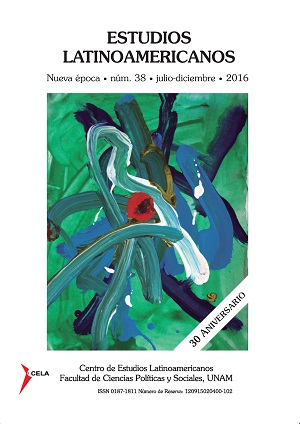Venezuela in transition. Regime in crossroads
Main Article Content
Abstract
Downloads
Article Details
Citas en Dimensions Service
References
ÁLVAREZ, A. E. (1996), “La crisis de hegemonía de los partidos políticos venezolanos”, en A. E. Álvarez (coordinador), El sistema político venezolano: Crisis y Transformaciones, Caracas, Universidad Central de Venezuela.
AZCARGORTA, Jesús (2008), PSUV ¿Partido único o partido hegemónico?, Caracas, Universidad “Simón Bolívar”, Trabajo de Grado de Maestría.
BRICEÑO, Héctor (2011), “Reformas electorales y desproporcionalidad en las elecciones parlamentarias de 2010”, en Cuestiones Políticas, vol. 27, núm. 47. Dirección URL: <http://produccioncientificaluz.org/index.php/cuestiones/article/view/
/14561>.
BRICEÑO, Héctor (2013), “Reformas electorales y sus efectos en el sistema político venezolano 1999-2010”, en Revista Politeia, Instituto de Estudios Políticos, Universidad Central de Venezuela, núm. 50, vol. 36. Dirección URL: <http://www.redalyc.org/articulo.oa?id=170035853006>.
INTERNATIONAL ENERGY AGENCY (2014), BP Statistical Review of World Energy, London. Dirección URL: <http://www.bp.com/statisticalreview>.
CORRALES, Javier y Manuel HIDALGO (2013), “El régimen híbrido de Hugo Chávez en la transición (2009-2013)”, en Desafíos, Bogotá, Universidad del Rosario, vol. 25, núm. 1.
CORRALES, Javier y Michael PENFOLD (2011), Dragon in the Tropics: Hugo Chávez and the Political Economy of Revolution in Venezuela, Washington, D. C., Brookings Institution Press.
CORRALES, Javier y Michael PENFOLD (2014), “Manipulating Term Limits in Latin America”, en Journal of Democracy, vol. 25, núm. 4, october.
DIAMOND, Larry (2002), “Thinking About Hybrid Regimes”, en Journal of Democracy, vol. 13, núm. 2.
DUCH, Raymond (2007), “Comparative studies of the economy and the vote”, en BOIX & STOKES, The Oxford Handbook of Comparative Politics, 2007, Oxford, Oxford University Press.
GÉLINEAU, François (2013), “Electoral accountability in the developing world”, en Electoral Studies, núm. 32.
HIDALGO, Manuel (2009), “Hugo Chávez’s ‘Petro-Socialism’”, en Journal of Democracy, vol. 20, núm. 2.
MAINGON, Thais (2003), “Venezuela: deslegitimación y colapso del sistema de partidos”, en Temas de Coyuntura, Caracas, Universidad Católica “Andrés Bello” (UCAB), núm. 53.
MAINWARING, Scott (2012), “From Representative Democracy to Participatory Competitive Authoritarianism: Hugo Chávez and Venezuelan Politics”, en Perspective on Politics, vol. 10, núm. 4.
MOLINA V., José Enrique y Carmen PÉREZ B. (1999), “La democracia venezolana en una encrucijada: las elecciones nacionales y regionales de 1998”, en América Latina Hoy, núm. 21. Dirección URL: <http://www.plataformademocratica.org/Publicacoes/Publicacao_7359_em_25_06_2009_23_56_10.pdf>.
MOLINA V., José Enrique (2000), “Sistemas electorales y sistemas de partidos en los países andinos”, en Espacio Abierto, vol. 9, núm. 004.
MORGAN, Jana (2011), Bankrupt representation and party system collapse, USA, Penn State Press.
NADEAU, Richard, Éric BÉLANGER y Thomas DIDIER (2013), “The Chávez vote and the national economy in Venezuela”, en Electoral Studies, núm. 32.
NORRIS, Pippa y otros (2016), The year in elections 2015, Sydney, Sydney University.
PENFOLD, Michael (2001), “El colapso del sistema de partidos en Venezuela: explicación de una muerte anunciada”, en J. V. CARRASQUERO, T. MAINGON y F. WELSCH (editores), Venezuela en transición: elecciones y democracia 1998-2000, Venezuela,
RedPol/CDB Publicaciones.
REY, Juan Carlos (2009), El sistema de partidos venezolano 1830-1999, Caracas, Publicaciones UCAB.
SALAMANCA, Luis (2014), “Venezuela. El ventajismo electoral institucionalizado”, en ALFARO & VANOLLI (editores), Campañas electorales. Ventajismo y reelección presidencial en América Latina, Caracas, Editorial Alfa.
SARTORI, G. (1999), Partidos y sistemas de partidos, Madrid, Alianza Editorial.

Este obra está bajo una licencia de Creative Commons Reconocimiento-NoComercial-SinObraDerivada 4.0 Internacional.

